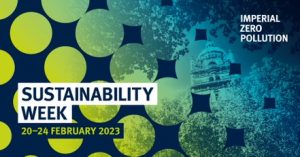It’s Sustainability Week at Imperial. So what better time to spotlight the brilliant work of the Sustainable Gas Institute’s Dr Jasmin Cooper.
On top of her day job – making a significant contribution to the scientific community’s understanding of greenhouse gas (GHG) emissions – Jasmin is also a member of the Department of Chemical Engineering’s (DoCE) sustainability committee. We caught up with Jasmin to find out more about what her role on the committee entails and how she her scientific skillset is playing a pivotal role in progressing Imperial’s sustainability ambitions.
There’s little disputing the scientific evidence that climate change is one of the greatest challenges facing human civilisation this century. We’re already seeing consequences globally. 2022’s floods in Pakistan and the big Christmas freeze in North America are just two of a growing list of recent events. Weather attribution (being able to prove the link between climate change and extreme weather such as heatwaves, droughts, floods and super-storms) is a growing field in itself that Imperial scientists are involved in. But when it comes to tackling the root causes, there’s an area of expertise that’s in at the beginning – Life Cycle Assessment (LCA).
The biggest challenge in changing human behaviour is that the causes of climate change – anthropologically generated greenhouse gases (GHGs) – are, a seemingly invisible threat. To cut GHG emissions, we need to better understand how much is produced and where they come from. Our sustainability committee is focused on doing that for DoCE operations.
Imperial’s Department of Chemical Engineering set up its sustainability committee in 2021. It’s part of a college-wide strategy to improve environmental sustainability across all of Imperial’s estate, both through efficiency and innovation – with the holy grail of achieving carbon neutrality by 2040.
A robust scientific technique for quantifying these emissions is Life Cycle Assessment (LCA). As we work, rest and play there’s a life cycle for everything we interact with. From the emissions impact of growing and processing the food we eat to the footprint of manufacture, usage and scrapping of the vehicles we drive – even the bikes we cycle and the streaming content we binge – everything has a carbon footprint.
Obtaining baseline data to quantify carbon emissions requires significant interdepartmental cooperation – with departmental operations, Imperial’s estates, ICT and campus services teams – and of course our student and academic population. So it’s as much an exercise in collaboration as it is scientific analysis
Once the carbon footprinting is done, across all of DoCE’s activities and building assets we move forward to the LCA. We’re then able to make assessments on where we can make changes to each pathway to reduce our emissions impact – hopefully to Net Zero by 2040.
In the meantime, if you want to help right away – here are some energy-saving tips from the sustainability committee.
